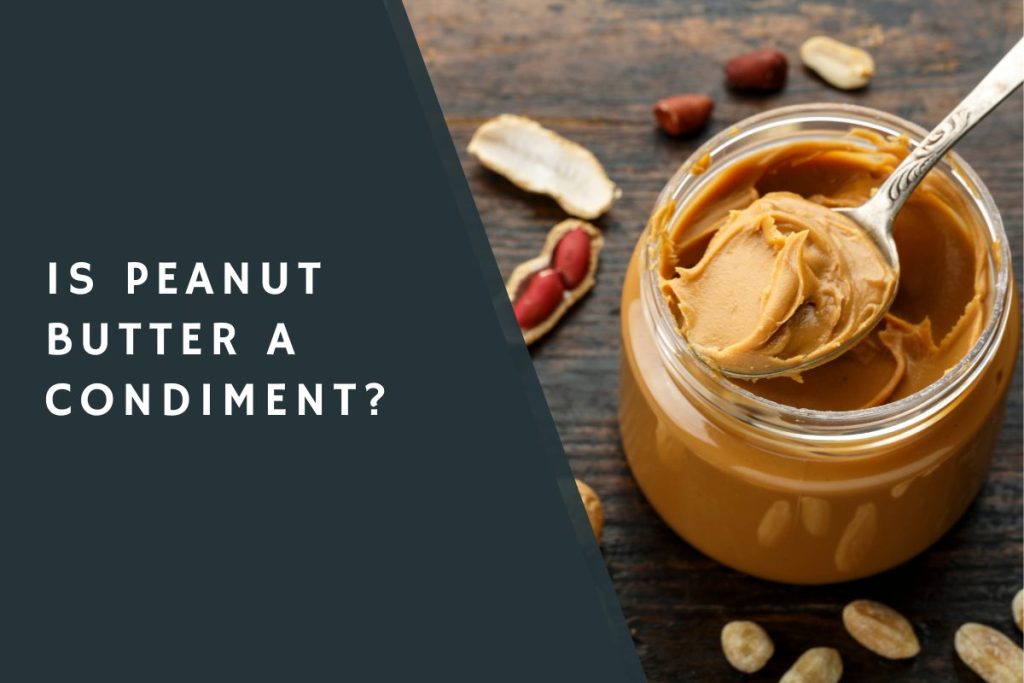Peanut butter is a beloved staple in many households, found in lunch boxes, pantries, and even on the dessert table. But where does peanut butter fit into the culinary world? Is it a condiment, a spread, or something else entirely?
Is Peanut Butter a Condiment?
Peanut Butter, also known as peanut butter, is a spread that is made from ground peanuts. It can be used as a spread or a dipping sauce. If you want to know whether peanut butter is a condiment, then yes, it is.
Let’s explore the unique position of peanut butter and answer the question: Is Peanut Butter a Condiment?

See Also: Is Butter a Condiment?
Is Peanut Butter a Condiment? – Peanut Butter as a Condiment
So, is peanut butter a condiment? Some people argue that it is, while others disagree. One reason that some people consider peanut butter to be a condiment is that it is often used in small amounts as a spread on sandwiches, toast, and crackers.
This is similar to how other condiments, such as ketchup or mayonnaise, are used. Peanut butter can also be used to add flavor and texture to recipes, similar to how other condiments are used.
On the other hand, there are also several reasons why peanut butter might not be considered a condiment. One reason is that it is often used in larger amounts than other condiments.
While condiments are typically used in small amounts to add flavor or texture to food, peanut butter is often used in larger amounts as a primary ingredient in recipes.
For example, peanut butter is a key ingredient in many cookies, cakes, and other baked goods.
In addition, peanut butter is often used as a standalone spread, rather than being combined with other ingredients to create a sauce or seasoning.
This is in contrast to many other condiments, which are typically used in combination with other ingredients to create a specific flavor or texture.
Peanut Butter as a Spread
Another way to look at the question of whether peanut butter is a condiment is to consider whether it is more accurately classified as a spread.
A spread is a type of food that is typically spread on top of or used to fill another food, such as bread or crackers. Some examples of spreads include cream cheese, jam, and butter.
Peanut butter could be considered a spread, as it is often used in this way on sandwiches, toast, and crackers. It is also similar to other spreads in that it is often used in larger amounts than condiments.
However, peanut butter is unique in that it is made from peanuts and has a distinct flavor and texture. This sets it apart from other spreads, which are typically made from dairy products or fruit.
Peanut Butter as a Protein-Rich Food
Another factor to consider when determining whether peanut butter is a condiment is its nutritional value.
Peanut butter is a good source of protein, with around 8 grams of protein per 2-tablespoon serving. It is also a good source of healthy fats, fiber, and several important vitamins and minerals.
Because of its high protein and nutrient content, some people view peanut butter more as a food rather than a condiment.
Peanut butter is often used as a snack or a source of protein in meals and can be eaten on its own, rather than being used as a flavor enhancer for other foods.
This is in contrast to condiments, which are typically used in smaller amounts to add flavor to food rather than being the main component of a meal or snack.
Conclusion
Is peanut butter considered a condiment? the question of whether peanut butter is a condiment is not a straightforward one.
While peanut butter can be used in similar ways to other condiments, such as being spread on sandwiches or used as an ingredient in recipes, it is also often used in larger amounts as a standalone spread or as a source of protein in meals.
Ultimately, whether peanut butter is considered a condiment or not may depend on how it is being used and the context in which it is being consumed.
I hope this blog post is helpful for you in understanding is peanut butter a condiment.
Read Also: Is Sugar a Condiment?

